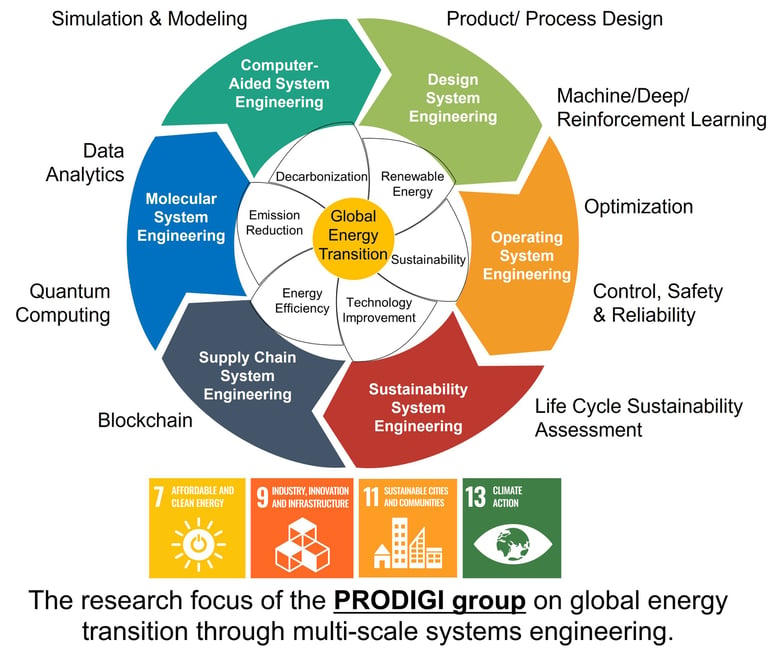
PRocess Optimization, Design InteGration, and Informatics
(PRODIGI) Research Group
PRODIGI research group conducts the fundamental research to lay the groundwork for new material discoveries, new energy technologies and flexible design, and a greater understanding of the physical universe using multi-scale process systems engineering (PSE) and hybrid mechanistic/data-driven modeling. All of these will result in advancements in energy security and transition, environmental protection, supply chain digitalization, process safety through computation and simulation, and data science, especially machine/deep/reinforcement learning, blockchain, and quantum computing. This allows to write research grants targeting DOE-Basic Energy Sciences (BES), DOD-Basic Scientific Research, NSF-Civil, Mechanical and Manufacturing Innovation (CMMI), and DARPA-Artificial Intelligence Exploration (AIE). We do the foundational research on (1) sustainable process design, integration, optimization, and control, (2) multi-scale hybrid mechanistic/data-driven modelling, (3) blockchains and game-theoretic approaches for resilient supply chains, and (4) mixed-integer and constrained optimization using quantum computing (QC) or hybrid QC/classical computing. These methodologies have a wide range of applications, including (1) sustainable hydrogen infrastructure for equitable low-carbon development, (2) carbon capture, utilization, and storage (CCUS) in clean energy transitions, (3) supply chain digitalization, and (4) smart additive manufacturing.


Our ultimate vision is to harness the potential of the big data generated from numerous Industry 4.0 elements to assure resiliency, sustainability, and fairness of the integrated processes under known and unknown uncertainties through classical global optimization solvers or by the newly developed physics-informed machine learning algorithms.
Join PRODIGI
We are looking for motivated students
We’re Seeking Candidates Who:
Are driven to apply computational techniques to optimize and control processes within energy, environment, supply chain management, and process safety.
Are enthusiastic about contributing to advancements in next-generation supply chains, sustainable hydrogen infrastructure, CCUS, industrial flare safety, and smart additive manufacturing
Possess a robust computational background, with substantial experience in coding, particularly in Python, Aspen, and GAMS. Having prior experience in working with any of the following: Solidity, nodeJS, Truffle, JavaScript, Web3, Metamask, and Hyperledger (IBM), would be advantageous.
Qualifications:
A bachelor’s/master’s degree in chemical engineering or a related field. Demonstrated proficiency in programming and computational modeling. A commitment to research excellence and a strong publication record (preferred).
To apply, email Dr. Kazi Monzure Khoda at kazi.khoda@sdsmt.edu, including your current CV, a concise statement of research interest (maximum 1 page), and a half-page summary about your coding experience. Applications will be evaluated as received, and only shortlisted candidates will be contacted for an interview.
PRODIGI Research Group
501 E. Saint Joseph St., Suite CBEC 3307, Rapid City, SD 57701, USA
Contact
kazi.khoda@sdsmt.edu
+1-979-721-0640
© 2025 PRODIGI Research Group, South Dakota Mines
Department of Chemical and Biological Engineering, South Dakota School of Mines and Technology.